How practice meets guidelines: Evaluation of nutrition counselling in Finnish well-women and well-baby clinics
Abstract
Aim: To assess the current practices of nutrition counselling given by nurses in well-women (WW) and well-baby (WB) clinics in Finland. Design: A semi-structured questionnaire was distributed to nurses and their clients in clinics nationwide. Main outcome measures: The source and the quality of nutrition counselling and specific conditions including allergic diseases and vitamin D supplementation. Results: The clinics constituted the most important source of information for the clients. Personal counselling was highly appreciated. However, 83% of pregnant women reported having received dietary counselling, which deviates from the figure reported by nurses (99%, p=0.0003). Counselling concerning allergies was targeted to reduce the risk of infant allergy by means of elimination diets. In contrast to the report of the nurses (60% in WW and 18% in WB clinics), only 16% (p<0.0001) of the pregnant and 7% (p=0.022) of the breastfeeding women reported that they had been advised to use vitamin D supplements during the winter season.
Conclusion: This study calls for co-operation between scientists, governmental policy makers and healthcare professionals to ensure a continuous chain of information, applicable to nutrition counselling, from scientific data to everyday practice.




